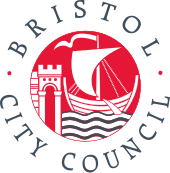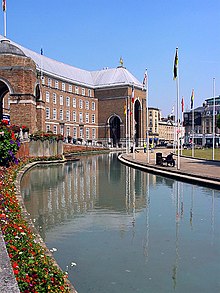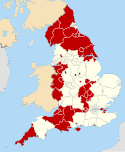Bristol City Council
Bristol City Council | |
|---|---|
 Coat of arms | |
 Council logo | |
| Type | |
| Type | |
| Leadership | |
| Structure | |
| Seats | 70 councillors[5] |
 | |
Political groups |
|
Joint committees | West of England Combined Authority |
Length of term | 4 years[4] |
| Elections | |
| Plurality-at-large | |
Last election | 2 May 2024 |
Next election | 4 May 2028 |
| Motto | |
| Virtute et Industria (By Virtue and Industry) | |
| Meeting place | |
 | |
| City Hall, College Green, Bristol, BS1 5TR | |
| Website | |
| www | |
Bristol City Council is the local authority for the city of Bristol, in South West England. Bristol has had a council from medieval times, which has been reformed on numerous occasions. Since 1996 the council has been a unitary authority, being a district council which also performs the functions of a county council. Bristol has also formed its own ceremonial county since 1996. Since 2017 the council has been a member of the West of England Combined Authority.
The council has been under no overall control since 2021. Following the 2024 election the Green Party was the largest party. Green councillor Tony Dyer was appointed leader of the council, and committee chair positions were shared amongst the Greens and Liberal Democrats. The council is based at City Hall on College Green.
History[edit]
Bristol was an ancient borough. Its date of becoming a borough is not known; its earliest known charter was issued by Henry II around 1164.[6] The borough had a mayor from at least 1216.[7]
The early borough was entirely in Gloucestershire, being on the north side of the original course of the River Avon, which formed the county boundary with Somerset. From the 13th century the borough boundaries were extended to include the Redcliffe area on the south side of river. In recognition of the town's growing importance, and also to avoid the administrative problems caused by the borough straddling two counties, in 1373 the borough was made a county corporate with its own sheriff.[8][6] Bristol became a city on the creation of the Diocese of Bristol in 1542.[9]
Bristol was reformed to become a municipal borough in 1836 under the Municipal Corporations Act 1835, which standardised how most boroughs operated across the country.[10] It was then governed by a body formally called the "mayor, aldermen and burgesses of the city of Bristol",[11] which was generally known as the corporation or city council.[12][13] The city boundaries were enlarged on numerous occasions.[14][15]

When elected county councils were established in 1889, Bristol became a county borough, with the council taking responsibility for county-level functions that would otherwise have fallen to a county council to provide.[16] In 1899 the city's mayor was raised to the status of a lord mayor.[7]
Local government was reformed in 1974 under the Local Government Act 1972. Bristol kept the same boundaries (which had last been expanded in 1966) but was reconstituted as a non-metropolitan district and placed in the new county of Avon, with county-level functions passing to the Avon County Council.[17] Bristol's borough and city statuses and its lord mayoralty were all transferred to the new district and its council, which took the name Bristol City Council.[18][19]
In 1996 the county of Avon and its council were abolished, and Bristol City Council gained responsibility for county-level services. The way this change was legally implemented was to create a new non-metropolitan county of Bristol covering the same area as the existing district, but with no separate county council; instead the existing city council took on county functions, making it a unitary authority. This therefore had the effect of restoring the city council to the powers it had held when Bristol was a county borough prior to 1974. As a consequence of being made a non-metropolitan county, the ceremonial position of Lord Lieutenant of Bristol was also created in 1996.[20]
Following a referendum in 2012, the council was led by a directly elected mayor.[21] The position was known as the Mayor of Bristol; it was distinct from the more ceremonial position of Lord Mayor. The mayor exercised executive powers and chose councillors to sit in a cabinet. It was decided via another referendum in 2022 to abolish the directly elected mayor's position, which took effect following the 2024 election. Since then, the council has been run by a committee system, with a leader of the council as its political leader instead.[22][23]
A combined authority was established in 2017 covering Bristol and the neighbouring Bath and North East Somerset and South Gloucestershire areas, called the West of England Combined Authority. It is chaired by the directly elected Mayor of the West of England.[24][25]
Governance[edit]
Bristol City Council provides both district-level and county-level functions. There are no civil parishes in the city,[26] but the city council runs nine area committees to discuss local matters.[27]
Political control[edit]
The council has been under no overall control since 2021. The Green Party became the largest party following a by-election in February 2023, but until the ending of the mayoral system in May 2024 the council continued to be led by the Labour mayor, Marvin Rees, and the cabinet he chose.[28] Following the 2024 election the Green Party increased their number of seats, but remained two seats short of having an overall majority. Green councillor Tony Dyer was subsequently appointed leader of the council and chair of the co-ordinating Strategy and Resources Policy Committee. Other policy committee chair positions were shared amongst the Greens and Liberal Democrats.[29][30]
Political control of the council since the 1974 reforms took effect has been as follows:[31]
Lower tier non-metropolitan district
| Party in control | Years | |
|---|---|---|
| Labour | 1974–1983 | |
| No overall control | 1983–1986 | |
| Labour | 1986–1996 | |
Unitary authority
| Party in control | Years | |
|---|---|---|
| Labour | 1996–2003 | |
| No overall control | 2003–2009 | |
| Liberal Democrats | 2009–2011 | |
| No overall control | 2011–2016 | |
| Labour | 2016–2016 | |
| No overall control[32] | 2016–2016 | |
| Labour | 2016–2021 | |
| No overall control | 2021–present | |
Leadership[edit]
Prior to 2012, political leadership was provided by the leader of the council. The leaders from 1974 to 2012 were: [33][34]
| Councillor | Party | From | To | |
|---|---|---|---|---|
| Charles Merrett[35] | Labour | 1 Apr 1974 | 1978 | |
| Claude Draper | Labour | 1978 | May 1983 | |
| Bob Wall[36] | Conservative | May 1983 | May 1984 | |
| Graham Robertson[37] | Labour | May 1984 | May 1997 | |
| George Micklewright[38][39] | Labour | May 1997 | May 2002 | |
| Diane Bunyan[40] | Labour | May 2002 | May 2003 | |
| Barbara Janke[41] | Liberal Democrats | Jun 2003 | Nov 2004 | |
| Peter Hammond[42] | Labour | 9 Nov 2004 | May 2005 | |
| Barbara Janke | Liberal Democrats | May 2005 | May 2007 | |
| Helen Holland | Labour | 22 May 2007 | 24 Feb 2009 | |
| Barbara Janke | Liberal Democrats | 24 Feb 2009 | 15 May 2012 | |
| Simon Cook | Liberal Democrats | 15 May 2012 | 18 Nov 2012 | |
Between 2012 and 2024 the council had directly-elected mayors. The mayors were:
| Mayor | Party | From | To | |
|---|---|---|---|---|
| George Ferguson | Independent | 19 Nov 2012 | 8 May 2016 | |
| Marvin Rees | Labour | 9 May 2016 | 5 May 2024 | |
In 2024 the position of directly elected mayor was abolished and the post of leader of the council re-established. The leaders since 2024 have been:
| Councillor | Party | From | To | |
|---|---|---|---|---|
| Tony Dyer[43] | Green | 21 May 2024 | ||
Composition[edit]
Following the 2024 election and a subsequent disqualification, the composition of the council was:[44][45]
| Party | Councillors | |
|---|---|---|
| Green | 34 | |
| Labour | 20 | |
| Liberal Democrats | 8 | |
| Conservative | 7 | |
| Vacant | 1 | |
| Total | 70 | |
A by-election may be called for the vacant seat. Otherwise, the next election is due in May 2028.
Elections[edit]
Since the last boundary changes in 2016 the council has comprised 70 councillors representing 34 wards, with each ward electing one, two or three councillors. Elections are held every four years.[46]
Premises[edit]
The council meets and has its main offices at City Hall on College Green. The building was purpose-built for the council. Construction began in the 1930s but was paused due to the Second World War. The building was evenutally completed in 1952.[47] It was called the 'Council House' until 2012, when it was renamed 'City Hall'.[48]
Prior to 1952 the council met at the Old Council House on Corn Street, which had been completed in 1827.[49]
Bristol City Youth Council[edit]
The Bristol City Youth Council (BCYC) are an elected group of young people aged 11 to 18. Members are voted for in the Bristol Big Youth Vote, which takes place in schools, with students voting. The constituencies for Youth Council are divided into Bristol North, Bristol East Central, and Bristol South, with each area having eight members. This is in addition to several co-optees from special representation groups such as Young Carers, Unity Youth, and the Children in Care Council.
The purpose of the Youth Council is express young people's views on the decisions that are important to them and that their opinions are voiced and heard. They also run internal and external campaigns
The Youth Council also internally elects two members of youth parliament (MYP), and two youth mayors.[50]
See also[edit]
References[edit]
- ^ "Bristol City Council Senior Leadership".
- ^ "New committees era begins at Bristol City Council". BBC News. 21 May 2024. Retrieved 22 May 2024.
- ^ Postans, Adam (20 September 2023). "Bristol City Council chief executive has contract extended to oversee move to committee system". Bristol Live. Retrieved 14 February 2024.
- ^ Bristol City Council
- ^ "Open Council Data UK - compositions councillors parties wards elections". Opencouncildata.co.uk. Retrieved 9 December 2021.
- ^ a b Report of the Commissioners Appointed to Inquire into the Municipal Corporations in England and Wales: Appendix 2. 1835. pp. 1151–1152. Retrieved 22 May 2024.
- ^ a b "Mayors of Bristol since 1216" (PDF). Bristol City Council. Archived from the original (PDF) on 5 April 2013. Retrieved 22 May 2024.
- ^ Ralph, Elizabeth (1973). Government of Bristol, 1373–1973. Bristol: Corporation of Bristol. pp. 5–6. Retrieved 23 May 2024.
- ^ Cannon, John (2001). Oxford Dictionary of British History. Oxford: Oxford University Press. p. 154. Retrieved 23 May 2024.
- ^ Municpal Corporations Act. 1835. p. 455. Retrieved 22 May 2024.
- ^ A Collection of the Public General Statutes, Passed in the Nineteenth and Twentieth Years of the Reign of Her Majesty Queen Victoria. 1866. p. 491. Retrieved 23 May 2024.
- ^ Ralph, Elizabeth (1971). Guide to the Bristol Archives Office. Bristol. p. 32. Retrieved 23 May 2024.
{{cite book}}: CS1 maint: location missing publisher (link) - ^ Statutory Rules and Orders. London: His Majesty's Stationery Office. 1903. p. 1741. Retrieved 23 May 2024.
- ^ "Bristol Municipal Borough / County Borough". A Vision of Britain through Time. GB Historical GIS / University of Portsmouth. Retrieved 23 May 2024.
- ^ Ralph, Elizabeth (1973). Government of Bristol, 1373–1973. Bristol: Corporation of Bristol. p. 57. Retrieved 23 May 2024.
- ^ "Local Government Act 1888", legislation.gov.uk, The National Archives, 1888 c. 41
- ^ "The English Non-metropolitan districts (Definition) Order 1972", legislation.gov.uk, The National Archives, SI 1972/2039, retrieved 23 May 2024
- ^ "District Councils and Boroughs". Parliamentary Debates (Hansard). 28 March 1974. Retrieved 23 May 2024.
- ^ "No. 46255". The London Gazette. 4 April 1974. p. 4400.
- ^ "The Avon (Structural Change) Order 1995", legislation.gov.uk, The National Archives, SI 1995/493, retrieved 23 May 2024
- ^ "Bristol votes in favour of directly-elected mayor". BBC News. 4 May 2012. Retrieved 23 May 2024.
- ^ "Bristol mayor vote: City decides to abolish mayor post". BBC News. 6 May 2022. Retrieved 23 May 2024.
- ^ Seabrook, Alex (29 December 2023). "The huge political switch happening in Bristol in 2024 that will completely change how the city is run". Bristol Post. Retrieved 31 December 2023.
- ^ "'Metro mayor' to run new West of England authority". ITV News. 15 November 2016. Retrieved 23 May 2024.
- ^ "The West of England Combined Authority Order 2017", legislation.gov.uk, The National Archives, SI 2017/126, retrieved 23 May 2024
- ^ "Election Maps". Ordnance Survey. Retrieved 23 May 2024.
- ^ "Committee Structure". Bristol City Council. Retrieved 23 May 2024.
- ^ Seabrook, Alex (3 February 2023). "Bristol by-election: Green Party becomes largest on council". BBC News. Retrieved 3 February 2023.
- ^ "Bristol City Council's new committee roles are approved". BBC News. 21 May 2024. Retrieved 21 May 2024.
- ^ Postans, Adam (15 May 2024). "Greens to lead Bristol City Council in 'coalition' with Lib Dems". Bristol Live. Retrieved 21 May 2024.
- ^ "Compositions calculator". The Elections Centre. Retrieved 26 May 2023.
- ^ "Labour loses its majority on Bristol City Council after 'purge' of Corbyn supporters". The Independent. Retrieved 17 February 2017.
- ^ "Council minutes". Bristol City Council. Retrieved 10 June 2022.
- ^ Farell Roig, Estel (29 March 2022). "What council leadership was like prior to elected mayor". Bristol Live. Retrieved 17 April 2024.
- ^ Webber, Jim (1 April 1974). "Pageantry salute to new Bristol". Evening Post. Bristol. p. 3. Retrieved 17 April 2024.
- ^ Wright, Mary (21 May 1983). "Deputy for the second time". Western Daily Press. p. 5. Retrieved 17 April 2024.
- ^ "Tories fume over civic 'pact'". Western Daily Press. 1 June 1984. p. 11. Retrieved 17 April 2024.
- ^ "Labour's backroom boy takes the helm". Western Daily Press. 5 May 1997. p. 13. Retrieved 17 April 2024.
- ^ "Bristol City Council leader unseated". BBC News. 3 May 2002. Retrieved 17 April 2024.
- ^ "Council leader loses seat". BBC News. 1 May 2003. Retrieved 17 April 2024.
- ^ "Council crisis over as leader appointed". BBC News. 17 June 2023. Retrieved 17 April 2024.
- ^ "Labour regain control of Bristol". BBC News. 10 November 2004. Retrieved 17 April 2024.
- ^ "New committees era begins at Bristol City Council". BBC News. 21 May 2024. Retrieved 22 May 2024.
- ^ "Local elections 2024: full mayoral and council results for England". The Guardian. 4 May 2024. Retrieved 21 May 2024.
- ^ "Bristol City councillor disqualified weeks after local election". BBC News. 21 May 2024. Retrieved 21 May 2024.
- ^ "The Bristol (Electoral Changes) Order 2015", legislation.gov.uk, The National Archives, SI 2015/1871, retrieved 23 May 2024
- ^ Historic England. "Council House and attached railings and piers, College Green (Grade II*) (1282341)". National Heritage List for England. Retrieved 23 May 2024.
- ^ "Bristol mayor George Ferguson is sworn in". BBC News. 19 November 2012. Retrieved 23 May 2024.
- ^ Historic England. "The Old Council House and attached front gates (Grade II*) (1207433)". National Heritage List for England. Retrieved 23 May 2024.
- ^ "Bristol City Youth Council and Youth Mayors". Bristol City Council. Retrieved 21 February 2023.

